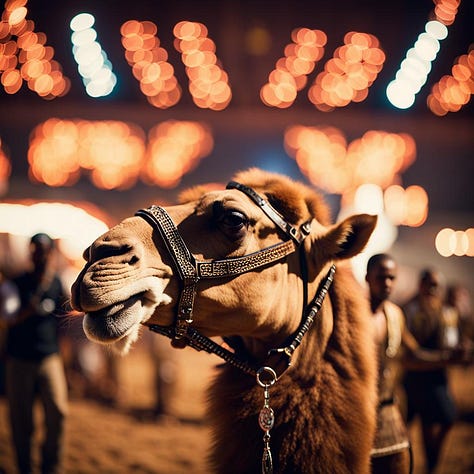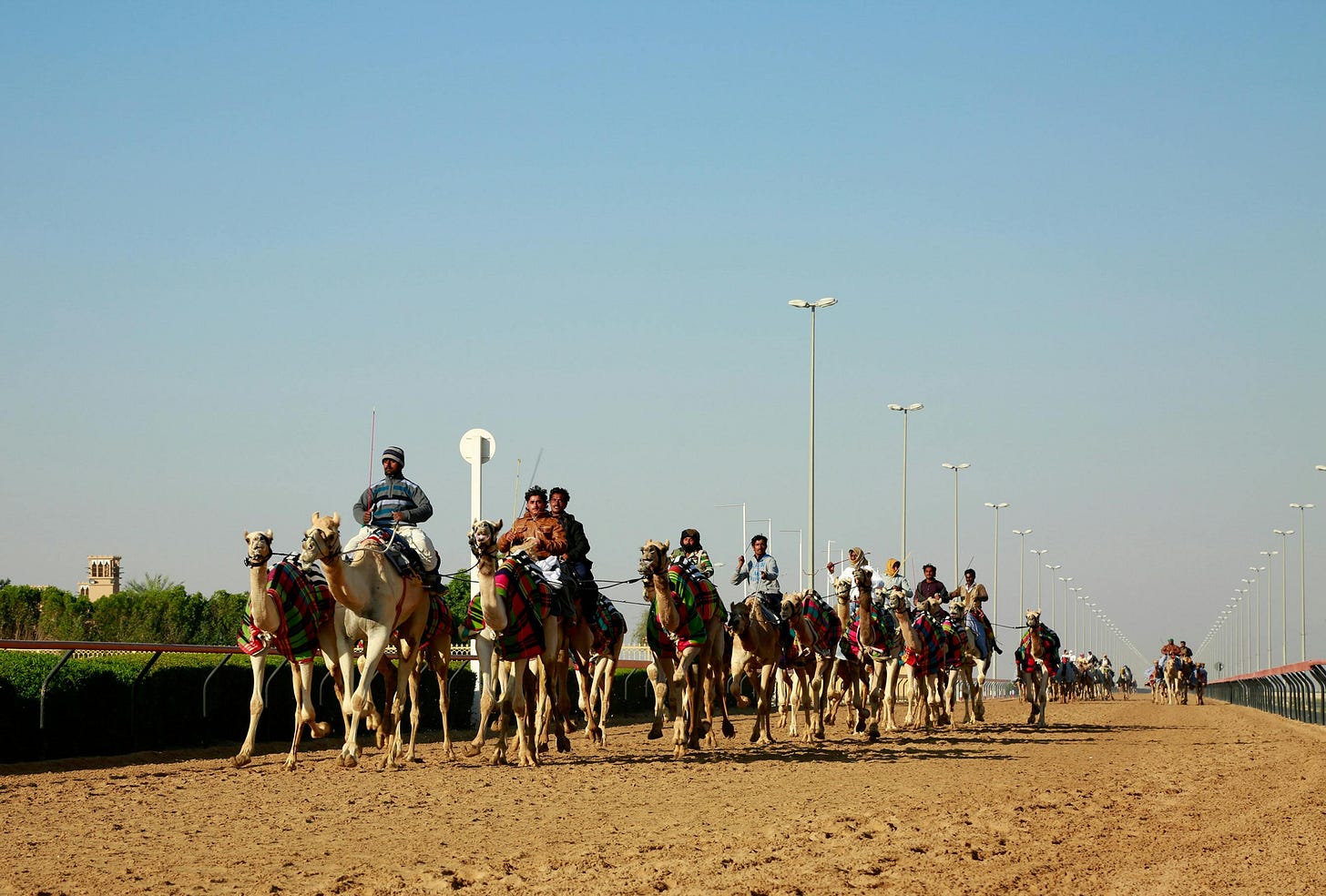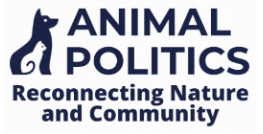Camel Racing in the Spotlight: Swizz Beatz's Cultural and Ethical Journey
Balancing Cultural Appreciation with Ethical Responsibility
Introduction
Swizz Beatz, the Grammy-winning music producer, has ventured into the traditional sport of camel racing in Saudi Arabia, making history as the first African-American and Westerner to own a camel racing team and win a camel race. His involvement has sparked discussions on cultural appropriation, human rights abuses, and animal welfare, raising questions about the ethical implications of his new passion.



Swizz Beatz's Entry into Camel Racing
In 2020, Swizz Beatz, known for his significant contributions to the music industry, decided to explore a new venture: camel racing. He founded his team, initially named Kaseem Abu Nasser and later rebranded as the Saudi Bronx. Swizz spent a month in Dubai, learning about camel bloodlines, selecting top-notch trainers, and curating a prime fleet of camels. His team has since achieved notable success, including winning the prestigious Saudi Camel Federation Cup and competing for a $21 million prize at the AlUla Camel Cup.
Cultural Appropriation Concerns
Swizz Beatz's involvement in camel racing raises important questions about cultural appropriation. While he expresses admiration for the culture and traditions of camel racing, critics argue that his participation may be seen as an outsider capitalizing on a deeply rooted cultural practice. This mirrors broader concerns about Western celebrities engaging in culturally significant activities without fully understanding or respecting their origins.
Swizz himself has stated that he sees his involvement as a way to bridge cultural gaps and promote mutual understanding. He was inspired by friends and their families in Dubai who were already involved in the sport, which gave him access to insider knowledge and resources. "Once I knew that no one else on this side had ever done it, that we could have fun and educate people about the culture, that’s how I knew it was for me," he expressed. Despite his intentions, the debate on cultural appropriation continues, emphasizing the need for sensitivity and respect in cross-cultural engagements—especially when human and animal welfare are at risk.
On the other hand, some people view concerns about cultural appropriation as overblown or even "silly." They argue that cultural exchange is a natural and positive aspect of human interaction, fostering mutual understanding and appreciation between different cultures. From this perspective, Swizz Beatz's involvement in camel racing could be seen as a form of cultural appreciation rather than appropriation. His efforts to learn about the sport, invest in it, and promote it globally could be viewed as a respectful engagement with a different culture. However, this begs the question: can a sport with a long history of human and animal abuse be respected?
Perceptions of the Local Community and Experts in Cultural Studies
The Saudi community's perception of Swizz Beatz's involvement in camel racing is mixed. Some locals appreciate his efforts to bring international attention to the sport and view his participation as a positive cultural exchange. Mahmoud al-Balawi, head of the Saudi Camel Racing Federation, stated that the kingdom's goal is for camel racing to become "an internationally recognized sport" and sees Swizz Beatz's involvement as a step towards achieving that goal.
However, others in the local community and experts in cultural studies express concerns about the potential for cultural appropriation. They argue that while Swizz Beatz's intentions may be genuine, his actions could inadvertently overshadow the contributions of those who have been part of this tradition for generations. The camel, deeply embedded in Bedouin culture, symbolizes a shared nomadic heritage and cultural identity. Experts emphasize the importance of understanding and respecting the cultural significance of camel racing to avoid commodifying and trivializing this rich tradition.
Human Rights Issues
Historically, camel racing has faced significant human rights criticisms, particularly regarding the use of child jockeys. Young boys, often trafficked from impoverished regions in South Asia, were subjected to harsh conditions, including physical abuse and meager food rations to keep their weight low for racing. Human rights investigators have uncovered evidence of children being held in near-slave conditions in the United Arab Emirates (UAE), with some tragically losing their lives during races. Despite a ban on child jockeys in 2005, reports indicate that children were still being used as jockeys as recently as 2010.
The introduction of robotic jockeys has mitigated some of these concerns, but the legacy of these abuses continues to cast a long shadow over the sport. Swizz Beatz's involvement in camel racing brings renewed attention to these issues, highlighting the need for ongoing vigilance and reform to ensure the protection of human rights in the sport.
Animal Welfare Concerns
Camel racing also raises ethical questions about animal welfare. Critics argue that camels are often subjected to harsh training methods and physical strain. Practices such as whipping and forced running can cause significant stress and injury to the animals. Again, the transition to robotic jockeys has mitigated some concerns, but the overall treatment of camels in the sport remains a contentious issue.
Swizz Beatz emphasizes the care and attention given to the camels, focusing on their behavior and bloodlines to identify top performers. This focus on bloodlines raises concerns about eugenics, similar to those seen in other animal competitions like the Westminster Dog Show. Eugenics in animal breeding involves selecting for specific traits, which can lead to genetic issues and ethical questions about the manipulation of animal genetics for human purposes.
The ethical treatment of the animals involved must remain a priority. As Swizz continues to invest in and promote camel racing, the welfare of the camels should be a central concern to ensure the sport's sustainability and ethical integrity.
Current State of Camel Welfare
The current state of camel welfare in the sport is a mixed picture. According to UNESCO, camel racing involves several stages of preparation, including special diets and supervised training on racetracks. Community committees oversee these processes to ensure adherence to traditions and principles. However, despite these efforts, concerns about the physical strain and harsh training methods persist. Camels can run at speeds up to 40 mph, which places significant stress on their bodies.
Studies and reports have highlighted the use of advanced training techniques, such as treadmills and swimming pools, to prepare camels for races. These methods aim to improve the camels' physical condition while minimizing injury risks. Nonetheless, the ethical implications of breeding and training practices continue to be debated, with calls for more stringent welfare standards and oversight.
Swizz Beatz's Perspective
Swizz Beatz has defended his involvement, emphasizing his extensive research and genuine interest in the sport. He views camel racing as a way to honor and promote the sport while bridging cultural gaps. His investment in the sport includes not only financial resources but also efforts to modernize and bring international attention to camel racing. Swizz has also considered bringing the camel racing culture to the United States, aiming to educate people about the tradition and foster greater cultural understanding.
Conclusion
Swizz Beatz's involvement in camel racing is a complex issue that touches on cultural appropriation, human rights, and animal welfare. While his intentions may be to honor and promote the sport, the broader implications of his actions highlight the need for sensitivity and awareness in cross-cultural engagements. As camel racing continues to evolve, there is an opportunity to implement animal welfare safeguards that the horse racing industry in the United States still struggles with today. Ongoing scrutiny and dialogue will be essential to address these ethical concerns and ensure the humane treatment of both human and animal participants.
Ed Boks is a former Executive Director of the New York City, Los Angeles, and Maricopa County Animal Care & Control Departments. He is available for consultations. His work has been published in the LA Times, New York Times, Newsweek, Real Clear Policy, Sentient Media, and now on Animal Politics with Ed Boks.






I don't even know how to respond other than to say I'm disappointed the media is having a heyday with this topic. I wish they'd focus on yet another human endeavor that puts animals at risk for sport and money. Thanks for bringing that forward in this post!
Last but not least, I believe Hitler made the final call on human eugenics. Perhaps we should apply that lesson to the dog, horse, other breeding as well.